Party Games vs. Deduction vs. Hidden Role
Assembling a crowd of your closest friends, lying to them, and loudly accusing them of betrayal can be more fun than you might think. Social deduction games are a popular genre of board games. At least, among those who don’t have any trouble finding five to ten people to play. Games like Ultimate Werewolf and Secret Hitler bake together three tasty game types that taste great together: deduction games, hidden role games, and party games.

Games that include one or two of these three game mechanisms sometimes get lumped together as social deduction games. But not all deduction games are party games. Not all hidden role games use deduction. And there are many party games that don’t have hidden roles or deduction.
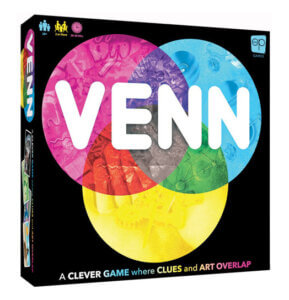
What’s the difference between a deduction game, a party game, and a hidden role game? Sorting these games into sets gives us a Venn diagram of board games (Not to be confused with the new game Venn, which is a party game but has no hidden roles).
We find games that occupy only one circle, games inhabiting the overlap between two genres, and finally, social deduction games, which sit in the middle, incorporating elements of all three game elements.
Let’s look at each game mechanism and the games that take advantage of them.
What is a Deduction Game?
Deduction is a process of reasoning that starts with a set of facts, makes observations, and then draws a conclusion that is consistent with the facts and observations. In a game, those facts often take the form of rules.
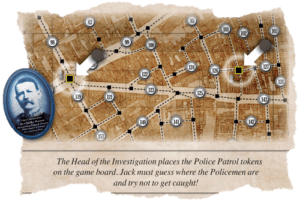
In a game of Sudoku, the number 7 can only appear once in each row, column, and square. Those are the facts. If I am puzzling over an empty space and I see that there is already a 7 in that column, then I deduce that the answer cannot be 7. By eliminating other numbers by the same process, I might deduce that the correct answer is 3.
Many games require players to make deductions to succeed at the game. In Clue, players must deduce the murderer, weapon, and location of the crime based on information they learn during the game.
Deduction games fit effortlessly with crime and detective themes. Scotland Yard, Letters from Whitechapel, Whitehall Mystery, Cryptid, and Sherlock Holmes Consulting Detective are all deduction games with a mystery theme.
What is a Party Game?
A party game encourages social interaction and can be played with large groups of people—sometimes up to 20, although 5 to 12 would be more common. They are usually quick to set-up and play, and they often have simple rules. Party games feature a lot of talking, guessing, conversation, laughter, and, sometimes, but not always, deduction.

Party games like Pictionary, Telestrations, Monikers, Wits & Wagers, and Wavelength often require drawing, acting, and guessing. A guessing game is almost by definition not a deduction game. If you are making an educated guess or a prediction based on probabilities, you are not using deductive reasoning.
What is a Hidden Role Game?
A hidden role game assigns each player a role that is unknown to other players. The role may grant the player unique powers or win conditions. Games with a traitor mechanic are hidden role games. These are semi-cooperative games in which most players are working together to achieve an objective, but one of the players is secretly a traitor who is sabotaging those efforts. In some games, the other players must deduce who the traitor is and either eliminate him or simply minimize his impact.
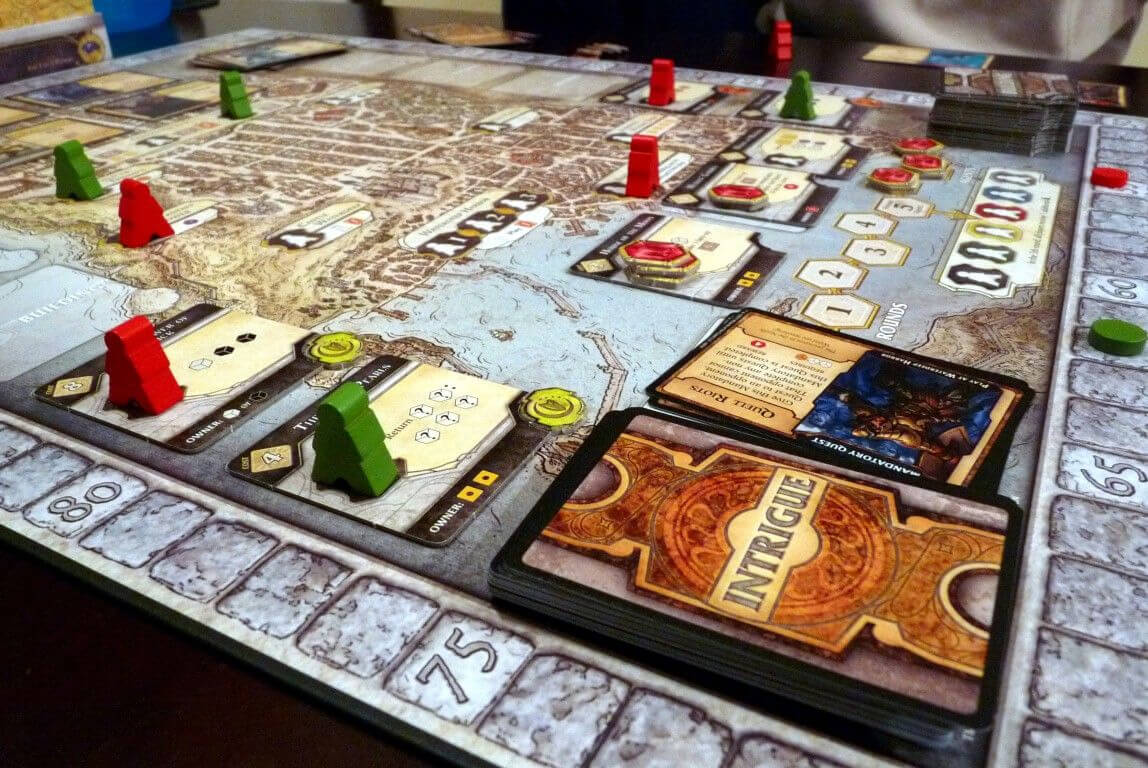
Some hidden role games aren’t party games, but I can’t think of any hidden role games that aren’t also deduction games. There is little point in giving players a hidden role if there isn’t an incentive for other players to figure out what those roles are, making the game a deduction game.
There are games like Lords of Waterdeep, which assigns each player one of the secretive Lords. But this hidden identity only affects scoring at the end of the game and doesn’t have a profound impact on how the game is played.
Deduction and Party Games—but not Hidden Role
It’s time to mix and match!
If we combine deduction mechanics and party games, but set aside hidden roles, then we get games like Decrypto and Codenames. These are games that are played as teams and can accommodate up to eight players. And they require deduction. Sort of.
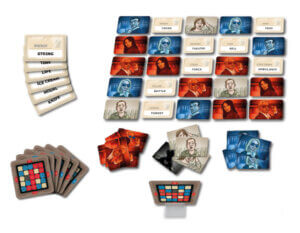
These are not deduction games in the strictest sense of the word, although they are generally regarded as deduction games in a looser board-game-sense. There is still a lot of guessing in these games based on unclear facts. But those guesses can eliminate choices and that process of elimination can require deduction.
The logic needed to make sense of your teammate’s clues adds a level of strategy not seen in other party games, making these games a good choice for large groups who aren’t afraid of a little thinking.
Examples
Deduction and Hidden Role—but not a Party Game
There are also games that utilize deduction and hidden roles but are not party games.
Most of these fall into the category of hidden traitor games. In games like Battlestar Galactica: The Board Game, players are working together to complete objectives, but they are being opposed by a traitor in their midst.
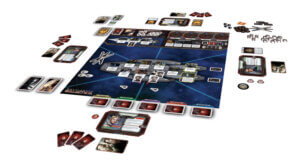
Roles are randomly assigned at the beginning of the game. Players who are secretly designated traitors can win only if they successfully sabotage the others. Sometimes, traitors don’t know they are traitors until later in the game.
The hidden role mechanic can make cooperative games more interesting by pitting one player against the others. This creates more drama and tension as players deduce the identity of the player foiling their plans. They also alleviate a common problem in cooperative games: the Alpha Player who tells everyone else how to play. That player has less influence when others suspect that he or she might be giving them bad advice on purpose.
If you enjoy cooperative games, but want more suspense and suspicion, ferret out any of these hidden role deduction games.
Examples
[ Read Feature Article: Unfathomable, by Fantasy Flight Games ]
Party Game and Hidden Role—but not a Deduction Game
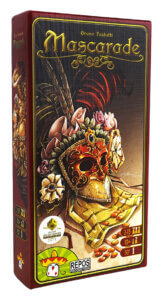
There aren’t many titles that are party games and hidden role games but not deduction games. When a game has hidden roles, it is usually the job of the players to deduce what those roles are.
Yet there are some hidden role party games that downplay deduction. The goal is not to eliminate the traitor or imposter. In some of these games, everyone has a secret identity that changes their personal objectives.
In other games, players don’t learn enough new information during the game to deduce the identity of others. Or the hidden identities of players change so much that deduction takes a back seat to a good memory.
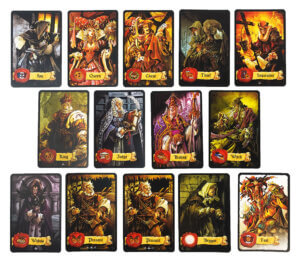
In these party games, the hidden roles add some spice to the mix without making the identification of those roles the primary focus.
Examples
Social Deduction Games: Deduction + Party + Hidden Role
Social deduction games are where everything comes together. Some party games shine with large groups of people incorporating hidden roles and deduction. This popular genre centers on figuring out who everyone is. To win, you must deduce who is on your team and who is not.

Opposing players need to be eliminated or sidelined, so deduction is at the very heart of games like Mafia, the godfather of social deduction games.
Ultimate Werewolf—and its many variants—is a typical social deduction game. Most of the players are villagers, but a small number of players are secretly werewolves. The werewolves know who is on their team, but the villagers are in the dark, suspecting everyone.
During the night phase, werewolves kill a villager. During the day, the survivors must deduce the identities of the werewolves and vote to eliminate them.

Most social deduction games are a variation on this kind of gameplay. There is a small team with full knowledge of the team compositions, and a larger team with incomplete knowledge. There are also many variations. In Coup, there are no teams. In The Resistance, there is no player elimination. And in Two Rooms and a Boom, teams are of equal size and no one is entirely sure who is on their team.
If you enjoy games with a lot of player interaction, intense discussions, and deception—and provided you have many friends—give one of these social deduction games a go.
Examples
- Ultimate Werewolf
- Two Rooms and a Boom
- Coup
- Love Letter
- Deception: Murder in Hong Kong
- The Resistance / Avalon
- Secret Hitler
- Quest
- Crossfire
- A Fake Artist Goes to New York
Deducing a Conclusion
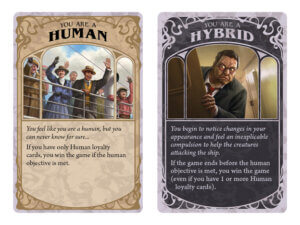
If you enjoy social deduction games, but you don’t have many people on hand, look for a game like Unfathomable or Dead of Winter. They provide the same level of suspense and suspicion at a lower player count.
If you have a large group but you want a lighter game with hidden roles, Saboteur or Mascarade are good choices.
And if you just want a more strategic party game without being singled out and exiled as a traitor, pick up Decrypto or Codenames.
Written by John David Thacker
John David is a freelance writer specializing in board games and the board game industry.
[ More from John David: 21 Classic Board Games of the 21st Century ]
